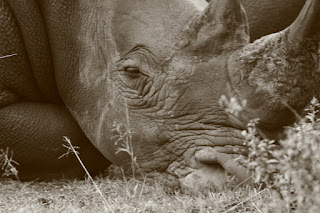This is a guest post by Moya Wa Tenga Guided Safaris
First time travellers to South Africa Kruger Park
It is also a common question raised on a number of travel forums on the web and, having guided in a number of these conservation areas over a number of years, one would think that it would be easy for me to provide an outright answer in favour of one area... but that is not the case.
You see, its just not that simple, each area has its own unique attractions, vegetation, climate, wildlife, lodges, operational procedures. These are just a few of the factors that contribute to the overall appeal of an area. What I can do though, is highlight the advantages and disadvantages of each of the reserves, which would make it a lot easier for you to decide which of these magnificent conservation areas would best suite your needs, expectations, and budget. I will hopefully make this a monthly post in the Destinations category over the next couple of months as I look comparing the following:
• Madikwe vs. Pilanesberg
• Pilanesberg vs Kruger National Park vs. Kgalagadi National Park
• The Private Reserves adjacent to Kruger National Park (APNR) vs. Madikwe
I have kept the areas to those which I have personal experience with.
Madikwe vs. Pilanesberg
Location & Getting There
Pilanesberg is situated a short 2.5 hours drive North West of Johannesburg. The Madikwe Game Reserve, situated against the Botswana border, around four hours drive from both Johannesburg and Pretoria
Based on location alone, Pilanesberg is clearly the better option if you have limited time (say 1 night) where as Madikwe would probably be a better option for longer stays of 2 nights or longer. Private road transfers are available for both of these reserves, whilst regular chartered flights into Madikwe Game Reserve can also be arranged.
A Brief History
Pilanesberg
Thanks to Operation Genesis in 1979, which involved the game-fencing of the reserve and the re-introduction of many long-vanished species, the park now has in excess of 7 000 animals including 24 of the larger species. The area is fringed by three concentric ridges or rings of hills - the formation rises from the surrounding plains like a bubble. The structure of the park is termed the "Pilanesberg Game Reserve Alkaline Ring Complex". Pilanesberg has survived ages of erosion and stands high above the surrounding bushveld plains. The early presence of man can be seen in the numerous Stone and Iron Age sites that are scattered throughout the park. The park exists within the transition zone between the dry Kalahari and wetter Lowveld vegetation, commonly referred to as "Bushveld". Unlike any other large park, unique overlaps of mammals, birds and vegetation occur because of this transition zone.
Madikwe
Madikwe Game Reserve was officiallys announced to the public in August 1991 and is now one of South Africa Dwarsberg Mountains
Both reserves are owned and managed by the provincial government's North West Parks
• Campsites from around R 210.00 a night for up to 6 people
• Safari Tents with communal ablution facilities from around R 750 for 2 pax/night to R 1 200.00pps/night
• Chalets with kitchen and ablution facilities form around R 1 800.00 for 4 pax/night
• 5 Star luxury Lodges form around R 2 150.00 pp/night sharing (Ivory Tree Game Lodge)
All of these accommodation options except for the 5 Star Lodges allow for you to drive through the park in your private vehicle. The 5 Star lodges include guided game drives on an open aired vehicle. These lodges still only have access to the same roads that the general public can drive, with the only real benefits being the services of a guide and the fact that sightings of the Big5 will be relayed between guides via radio.
Madikwe offers a far more exclusive experience. Accommodation options in Madikwe are dominated by luxurious private lodges ranging in size from 10 to 60 beds, including a very comfortable bush camp (with no electricity or running water). Prices range from around R 1 500.00 pp/night sharing for the bush camp, right up to in excess of R 8 000.00 pp/night sharing for some of the more exclusive camps. These rates usually include two guided game activities (walks or drives) per day, accommodation, all meals, and depending on the lodge, all local beverages and house wines. Some of the lodges in Madikwe include:
- Top End - Madikwe Hills, Royal Madikwe, Jaci's Safari & Tree Lodges
- Upper Range - Impodimo, Tuningi, Tau, Buffalo Ridge, Thakadu, Rhulani, Motswiri
Game and Bird Viewing
The open savannah of Pilanesberg makes spotting and viewing game fairly easy even for first time self-drivers. Sightings of Impala, Zebra, Wildebeest, Giraffe, Warthog, Hippo and White Rhino can almost be guaranteed even during a day trip to the park. Elephants, Brown Hyena and Lions are seen fairly regularly with sightings of leopard and buffalo being relatively scarce. Bare in might that its all about luck – the more time you spend out in the park the luckier you get! Pilanesberg is unique in that the series of concentric hills that dominate the landscape are the result it is an extinct volcanic system. It is these hills that provide a dramatic background to most of the sightings and add an interesting element to photography in the park.
Madikwe’s game viewing is of a very high standard, aided by the fact that all guides are in radio contact with one another, and provides regular sightings of zebra, Impala, wildebeest, giraffe, warthog, white rhino, lion, elephant, white rhino, brown hyena, and spotted hyena. Wild Dog, Buffalo
Another notable difference between these areas, apart form the frequency with which certain species are seen, is that your guide is allowed to go off-road for up to 500m in Madikwe.
No off-roading is permitted in Pilanesberg! This means that if you find lions walking down the road before heading off into the bush – you can follow up on them by driving off-road. This allows you to get far closer to the animals than you would normally be able to in Pilanesberg – a huge plus for photography! Where Pilanesberg wins hands down is on the birdlife, more specifically, water birds. There are a number of hides/blinds that have been built on the edges of waterholes, which provide excellent game and bird viewing opportunities. Photographers often congregate at these hides to capture images of Malachite Kingfishers and a variety of other water bird species.
Which should I choose?
Essentially, the two biggest factors in deciding which of these conservation areas is best suited for you will boil down to your budget. The luxurious lodges of Madikwe are great if they fall within your budget – I can assure you that you won’t be disappointed with the overall experience and would be only to pleased to assist you in finding a lodge which fits your budget. Pilanesberg is ideal for those with limited time, a tighter budget or who simply prefer to do a self drive vacation. (You can however have the guided experience by making use of our tailor made services, which include transport, the services of a private guide, all meals and limited local beverages. For more information on these packages, click here).
I hope you have found this post informative and helpful.
If you have any additional words of wisdom to add, please feel free to leave a comment at the bottom of the post. Also, if you require additional information or would like assistance with putting together a tailor-made itinerary to either of these parks, please contact me directly.


.jpg)
.jpg)





















.JPG)
.jpg)